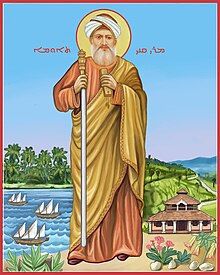Thomas of Cana | |
|---|---|
 Icon of Thomas of Cana | |
| Venerated in | Syriac Orthodox Church Knanaya Community Syro-Malabar Catholic Archeparchy of Kottayam |
| Canonized | 6 March 1990 by Ignatius Zakka I Iwas Patriarch |
| Feast | 36th day (Sixth Sunday) of the Great Lent (Syriac Orthodox Church) |
| Influenced | Saint Thomas Christians |
Thomas of Cana (Malayalam: K'nāi Thoma or Tomman Kinān, Syriac: K'nānāya Thoma) was a Syriac Christian merchant magnate who arrived to the Chera Dynasties capital city of Kodungallur between 345 A.D. and 811 A.D. Thoma brought with him Jewish-Christian families (early East Syriac Christian merchants) and clergymen from Persian Mesopotamia.[1][2]
Thoma received copper-plates of socio-economic rights known today as the Thomas of Cana copper plates.[3][4][5][6] The descendants of Thoma and the migrants who arrived with him are known as the Knanaya or Tekkumbhagar (Southist) Christians, found among the Saint Thomas Christian community of Kerala, India.[7][1] Scholars associate Thoma's migration with connecting the Church of Saint Thomas in India with the East Syriac liturgical tradition of the Persian Church of the East. [8][9]
Portuguese sources of the 17th century note that due to Thoma's deeds as a Christian merchant, the native Nasrani of Kerala venerated him as a saint.[10] Thoma was officially canonized by the patriarch of the Syriac Orthodox Church, Ignatius Zakka I, in March 1990.
- ^ a b Frykenberg 2010, pp. 113.
- ^ Fahlbusch 2008, p. 286.
- ^ D'Aguiar, Rev. J. Monteiro. 'The Magna Carta of St. Thomas Christians', K. S. P., no. 4, p. 172 and 195.
- ^ Indian Antiquary, LVI, 1927, p. 148.
- ^ King 2018, pp. 663–670.
- ^ Narayanan 2018, pp. 302–303.
- ^ Podipara 1971, p. 2.
- ^ Thomas 2018, p. 4.
- ^ Neill, pp. 42–43.
- ^ Vellian 1986, p. 18-25.
© MMXXIII Rich X Search. We shall prevail. All rights reserved. Rich X Search
